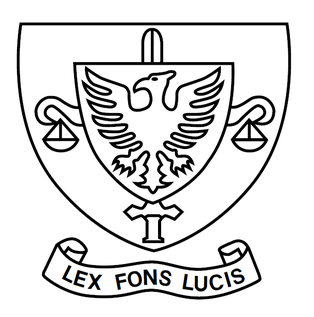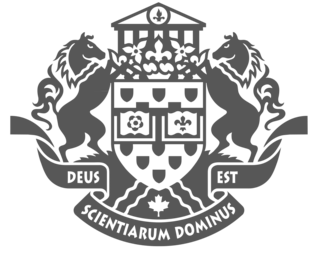
The University of Calgary is a public research university located in Calgary, Alberta, Canada. The University of Calgary started in 1944 as the Calgary branch of the University of Alberta, founded in 1908, prior to being instituted into a separate, autonomous university in 1966. It is composed of 14 faculties and over 85 research institutes and centres. The main campus is located in the northwest quadrant of the city near the Bow River and a smaller south campus is located in the city centre. The main campus houses most of the research facilities and works with provincial and federal research and regulatory agencies, several of which are housed next to the campus such as the Geological Survey of Canada. The main campus covers approximately 200 hectares.
The University of Toronto Faculty of Law is the law school of the University of Toronto. The Faculty's admissions process is the most selective of law schools in Canada and is one of the most selective in North America. The Faculty has consistently been ranked as the top law school in Canada by Maclean's since it began to publish law school rankings. The Faculty offers the JD, LLM, SJD, MSL, and GPLLM degrees in law.
A Master of Laws is an advanced postgraduate academic degree, pursued by those either holding an undergraduate academic law degree, a professional law degree, or an undergraduate degree in a related subject. In most jurisdictions, the LL.M. is the advanced professional degree for those usually already admitted into legal practice.

The Schulich School of Law is the law school of Dalhousie University in Halifax, Nova Scotia, Canada. Founded in 1883 as Dalhousie Law School, it is the oldest university-based common law school in Canada. It adopted its current name in October 2009 after receiving a $20-million endowment from Canadian businessman and philanthropist Seymour Schulich.

The University of Minnesota Law School is the law school of the University of Minnesota in Minneapolis, Minnesota. The school confers four law degrees: a Juris Doctor (J.D.), a Master of Laws (LL.M.), a Master of Science in Patent Law (M.S.P.L.), and a Doctor of Juridical Science (S.J.D.). The J.D. program offers a number of concentration opportunities, as well as dual and joint degree options with other graduate and professional schools of the university.

The American University Washington College of Law is the law school of American University, a private research university in Washington, D.C. It is located on the western side of Tenley Circle in the Tenleytown section of northwest Washington, D.C. The school is accredited by the American Bar Association and a member of the AALS.
Richard Francis "Dick" Haskayne is a Canadian retired accountant and oilman whose career spanned from 1956 to 2005. Haskayne served as the president and chairman of several major Canadian petroleum companies including Hudson's Bay Oil and Gas Company, Home Oil Company, Interprovincial Pipeline Company, Nova Corporation, and TransCanada Pipelines. He is also known for his association with the University of Calgary, whose management faculty was renamed the Haskayne School of Business in 2002.

A law school is an institution or professional school specializing in legal education, usually involved as part of a process for becoming a judge, lawyer, or other legal professional within a given jurisdiction.

The University of Alberta Faculty of Law is the graduate school of law of the University of Alberta in Edmonton, Alberta, Canada. Established as an undergraduate faculty in 1912 it is the third oldest law school in Canada, and often considered the oldest law school in Western Canada.
The University of Victoria Faculty of Law is a law school at the University of Victoria in Victoria, British Columbia, Canada. The school grants JD, JID, LLM, and PhD degrees in law.

The Schulich School of Engineering is the accredited engineering school of the University of Calgary located in Calgary, Alberta, Canada. It currently has 4,610 enrolled students and over 150 faculty members. The school offers seven engineering degree programs.

The University of Ottawa Faculty of Law is the law school at the University of Ottawa, located in Ottawa, Ontario, Canada. Established in 1953, the faculty is today divided into Civil Law and Common Law sections, the two formally recognized legal traditions in Canada.

The Faculty of Law is a faculty of the University of Windsor in Windsor, Ontario, Canada. The first class of students matriculated in 1968, and the current building was opened in 1970. The Faculty has grown immensely over the past 50 years, increasing its national profile through its innovations in research and from thousands of alumni across Canada and the world. The 2017 endowment to the Faculty of Law was $10.2 million. The Faculty is also the current academic host institution of the Canadian Bar Review (CBR), the most frequently cited journal by the Supreme Court of Canada.
The Haskayne School of Business is the University of Calgary's business school, located in Calgary, Alberta, Canada. It is named after Richard F. Haskayne, who gave one of the largest endowments to a business school in Canada. The school offers undergraduate, masters, and PhD degrees, as well as executive education programs. Haskayne is ranked as one of the top business schools in Canada and Top 100 in the world.

A Doctor of Law is a doctorate in legal studies.

Professor Janaka Ruwanpura is the Vice Provost and Associate Vice-President Research (International) of the University of Calgary, Canada effective Sept. 1, 2020. He has been the Vice-Provost International since 2013. In 2022, Janaka was a winner of the Top25 Canadian Immigrant Awards selected by Canadian Immigrant Magazine.

The School of Public Policy is an institute at the University of Calgary located in Calgary, Alberta, Canada. Founded in 2008, The school is devoted to public policy research and education, and is led by Martha Hall Findlay. Located at the University of Calgary’s downtown campus, it is home to over 60 full-time or part-time faculty and fellows. The school is organized into four policy areas: Energy and Environmental Policy, Fiscal and Economic Policy, International Policy and Trade, and Social Policy and Health. The school offers two master's degrees, a Master of Public Policy (MPP) and a Master of Science (MSc) in Sustainable Energy Development. SPP also offers ongoing education to policy professionals and stakeholders through two Applied Policy Outreach Centres: the Extractive Resource Governance Program (ERGP) and the Simpson Centre for Food and Agricultural Policy.
Christine E. Silverberg is a Canadian lawyer who was the first female Chief of the Calgary Police Service and later practiced law alongside Hersh Wolch, who famously won David Milgaard's wrongful conviction case.
Kathleen Sendall is a Canadian engineer. In 2005, she served as president of the Canadian Academy of Engineering. Throughout her career, which began in Alberta's oil and gas industry, she has held technical and executive positions and has actively promoted the participation of women in the profession of engineering. She is a member of the Order of Canada.












